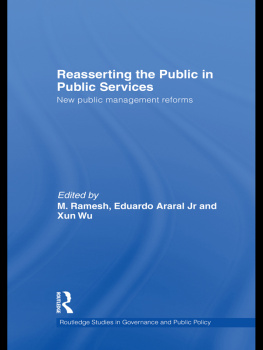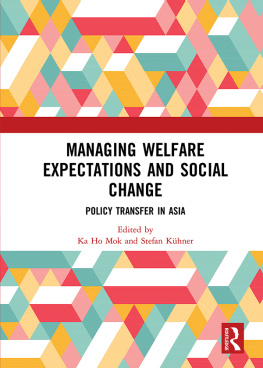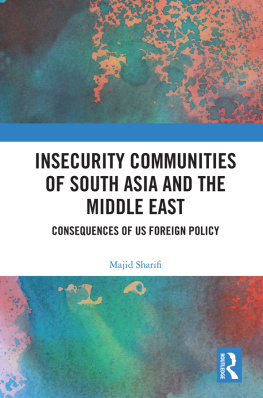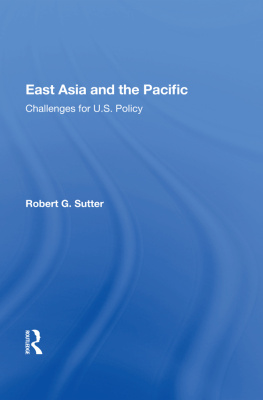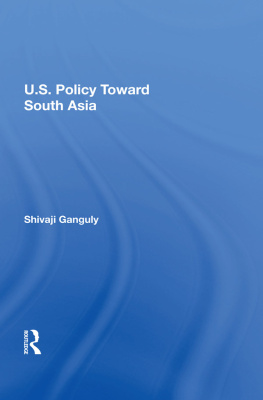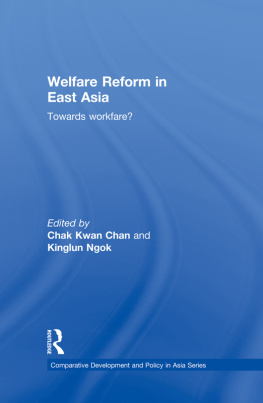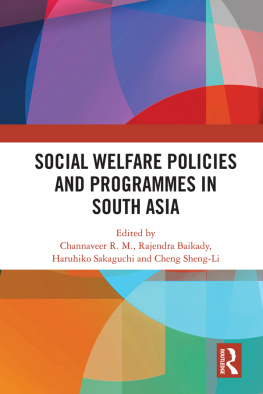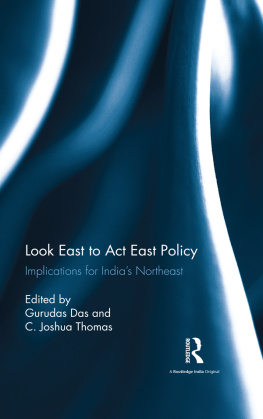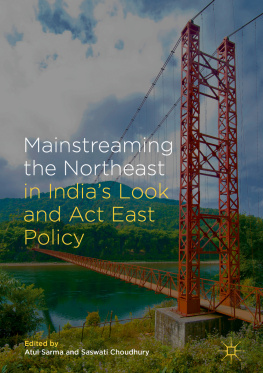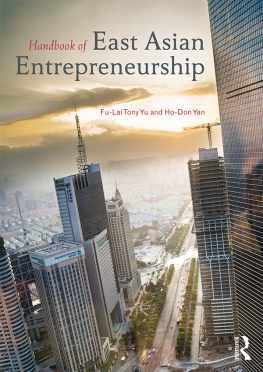SOCIAL POLICY IN EAST AND SOUTHEAST ASIA
Social Policy in East and Southeast Asia provides the first systematic comparison of income maintenance, health, housing, and education in Hong Kong, South Korea, Singapore, and Taiwan. It finds social policies in the four Asian newly industrialized economies to be remarkably developed and comprehensive.
Drawing upon extensive primary research, the author compares the provision, financing, and outcomes of social policies in these Asian countries. The policies of Korea and Taiwan place most importance upon health and income maintenance, while policy in Hong Kong foregrounds health and housing, and in Singapore education and housing. Comparing each countrys social policy with traditional ideals of the welfare state, the book concludes that Northeast Asian states, namely Korea and Taiwan, may be best described as conservative while those in Hong Kong and Singapore are more liberal as their policies focus more on supporting the market than maintaining income.
Locating the importance of Asian social policies in the wake of the recent financial crisis in the region, this work provides a comprehensive analysis of the different types of welfare state in contemporary Asia. It will be of interest to scholars of Asian Studies, Social Welfare, and Public Policy.
M. Ramesh is Senior Fellow in the Public Policy Program at the National University of Singapore and Associate Professor in Government at the University of Sydney.
ROUTLEDGECURZON ADVANCES IN ASIA-PACIFIC STUDIES
1 ENVIRONMENT, EDUCATION AND SOCIETY IN THE ASIA-PACIFIC
Local traditions and global discourses
David Yencken, John Fien and Helen Sykes
2 AGEING IN THE ASIA-PACIFIC REGION
David R. Phillips
3 CARING FOR THE ELDERLY IN JAPAN AND THE US
Practices and policies
Susan Orpett Long
4 HUMAN RIGHTS AND GENDER POLITICS
Asia-Pacific perspectives
Edited by Anne Marie Hilsdon, Martha Macintyre, Vera Mackie and Maila Stivens
5 HUMAN RIGHTS IN JAPAN, SOUTH KOREA AND TAIWAN
Ian Neary
6 CULTURAL POLITICS AND ASIAN VALUES
The tepid war
Michael D. Barr
7 SOCIAL POLICY IN EAST AND SOUTHEAST ASIA
Education, health, housing, and income maintenance
M. Ramesh
SOCIAL POLICY IN EAST AND SOUTHEAST ASIA
Education, health, housing, and income maintenance
M. Ramesh
First published 2004
by RoutledgeCurzon
11 New Fetter Lane, London EC4P 4EE
Simultaneously published in the USA and Canada
by RoutledgeCurzon
29 West 35th Street, New York, NY 10001
This edition published in the Taylor & Francis e-Library, 2005.
To purchase your own copy of this or any of Taylor & Francis or Routledges collection of thousands of eBooks please go to www.eBookstore.tandf.co.uk.
RoutledgeCurzon is an imprint of the Taylor & Francis Group
2004 M. Ramesh
All rights reserved. No part of this book may be reprinted or reproduced or utilized in any form or by any electronic, mechanical, or other means, now known or hereafter invented, including photocopying and recording, or in any information storage or retrieval system, without permission in writing from the publishers.
British Library Cataloguing in Publication Data
A catalogue record for this book is available from the British Library
Library of Congress Cataloging in Publication Data
Ramesh, M., 1960
Social policy in east and southeast Asia : education, health, housing and income maintenance / M. Ramesh.
p. cm.
Includes bibliographical references and index.
1. East AsiaSocial policy. 2. Asia, SoutheasternSocial policy.
3. East AsiaEconomic policy. 4. Asia, SoutheasternEconomic
policy. I. Title.
HN720.5.A8R36 2003
361.61095dc22
2003015577
ISBN 0-203-40111-5 Master e-book ISBN
ISBN 0-203-67142-2 (Adobe eReader Format)
ISBN 0-415-33255-9 (Print Edition)
CONTENTS
ILLUSTRATIONS
Figures
Tables
ACKNOWLEDGEMENTS
This book has been so long in writing that I have forgotten the names of some of the people who helped me along the way. My sincere thanks to everyone who helped me, not just those mentioned here.
Much of the research for the book was completed in 2000 for which I am grateful to the University of Sydney for granting me sabbatical leave. I spent the year in Hong Kong, Norway, Singapore and USA and am thankful to all the people who helped me during the period. In Hong Kong, Ian Holliday, Mok Ka Ho, Shaifqul Huque, Linda Wong, and Julia Tao in the Department of Public and Social Administration at the City University of Hong Kong were great colleagues during my short stay. At Harvard University, Amitav Acharya and Dennis Encarnation provided generous hospitality. In Norway, the Department of Comparative Politics at the University of Bergen gave me a writing fellowship and Kenneth Christie, John Fossum, and Stein Kuhnle gave me company and support. In Singapore, the Public Policy Program at the National University of Singapore hosted me for six months I am particularly grateful to Mukul Asher, Ong Jin Hui, and Scott Fritzen for their support.
I could not have completed the book without very generous support from government officials and academics in Korea and Taiwan who spent a great deal of time explaining the peculiarities of their countrys social policies and compiling statistics for me. In Korea, I am grateful to the following for their kindness: Byong-Ho Tchoe (KIHASA), Choon Sik Park (National Federation of Medical Insurance), Hanam Phang (Korea Labor Institute), Huck Ju Kwon (formerly at Sung Kyun Kwan University and now at UNRISD), Hwajong Baek (KIHASA), In Byung-Lo (National Federation of Medical Insurance), Kyungbae Chung (KIHASA), Choon-Sik Park (NHIC), Chang-Bae Chun (NHIC), Sung-Joon Paik (Korean Educational Development Institute), and Yoon Juh Yun and Chul Koh (Korea Research Institute for Human Settlement).
The list of Taiwanese government officials and academics I am thankful to is long and my gratitude to them deep: Jao Chih Chien (Bureau of Statistics), Cheng Wen-Yi (Department of Social Affairs), Ding-Yuan Chen (Public Service Pension Fund), Fu Li-Yeh (National Chengchi University), Hou-Sheng Chan (National Taiwan University), Jong-Tsun Huang (National Science Council), Maria Mei-Yang Chang (Manpower Planning, CEPD), Nana Wang (DGBAS), Pern Derg-Ming, (Bureau of Labor Insurance), Shwu-Jiuan Chen (Public Housing Department), Wang Hong-Zen (Tamkang University), Yu-Mei Chao (Bureau of National Health Insurance), Yeunn-Wen Ku (National Chi Nan University), and Sheng-Cheng Hu (Academica Sinica).
The research for this book was partially funded by grant from the Australian Research Council for which I am thankful.
I am also thankful to Michael Howlett of Simon Fraser University for his encouragement and thoughtful comments. Stephanie Rogers and her team at Routledge have been pleasant and very efficient thank you.
I started writing the book about the same time as Nikisha was conceived. I can hardly wait to read her the chapter on income maintenance for the aged! And, as always, I am thankful to Mandy for simply being my wife. Thanks to my sister and brothers, and their children, for their immense faith in me. My father passed away before this book was completed I dedicate it to his memory and to my mother who still believes in me despite receiving little in return.


